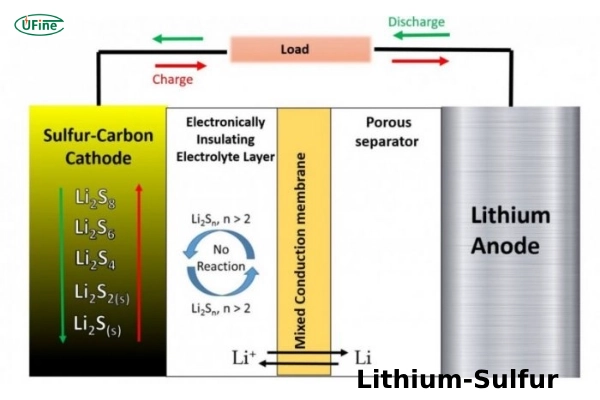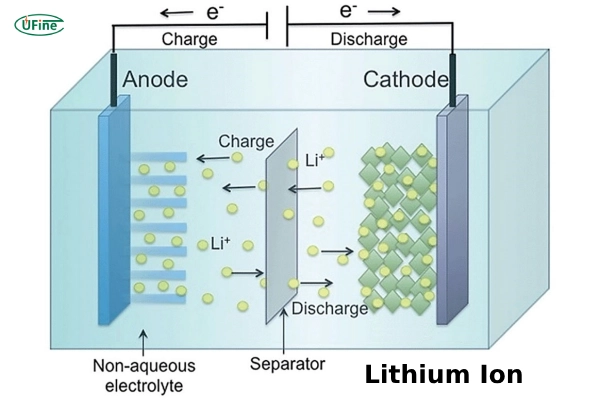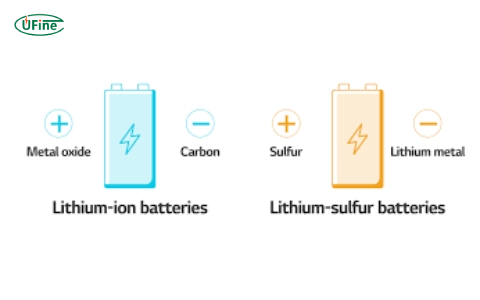Lithium-sulfur (Li-S) and lithium-ion (Li-ion) batteries are two prominent technologies in the rapidly evolving field of energy storage. Each has unique characteristics, advantages, and disadvantages that make them suitable for different applications. This article delves into the intricacies of both battery types, compares them, and provides guidance on choosing the right one for your needs.
Part 1. What are lithium-sulfur batteries?
Lithium-sulfur batteries are rechargeable batteries that use lithium at the anode and sulfur at the cathode. They are known for their high energy density and potential for lower costs compared to other battery types.
How Do Lithium-Sulfur Batteries Work?
Lithium-sulfur batteries operate through a chemical reaction between lithium and sulfur. During discharge, lithium ions move from the anode (lithium metal) to the cathode (sulfur), forming lithium sulfide. This reaction reverses during charging. The process involves the breaking and forming of polysulfides, which are intermediates in the reaction.
What are the Advantages of Lithium-Sulfur Batteries?
- Higher Energy Density: Li-S batteries offer a higher energy density than Li-ion batteries, potentially delivering up to 500 Wh/kg, about five times that of traditional Li-ion batteries.
- Lower Cost: Sulfur is abundant and inexpensive, which could make Li-S batteries more cost-effective in the long run.
- Environmental Benefits: Sulfur is a non-toxic material, making Li-S batteries more environmentally friendly than heavy metals.
What are the Disadvantages of Lithium-Sulfur Batteries?
- Shorter Lifespan: Li-S batteries suffer from a shorter cycle life due to the dissolution of polysulfides into the electrolyte, leading to capacity fade.
- Poor Conductivity: Sulfur and its discharge products have poor electrical conductivity, necessitating conductive additives, which can reduce the overall energy density.
- Volume Expansion: The significant volume change (up to 80%) during charge and discharge cycles can lead to mechanical degradation of the battery.
Part 2. What are lithium-ion batteries?
Lithium-ion batteries are a type of rechargeable battery commonly used in portable electronics and electric vehicles. They use lithium ions moving between the anode and cathode to store and release energy.
How Do Lithium-ion Batteries Work?
Lithium-ion batteries work by shuttling lithium ions between two electrodes: a graphite anode and a metal oxide cathode (commonly cobalt, nickel, or manganese). During discharge, lithium ions move from the anode to the cathode through an electrolyte, generating an electric current. The process reverses during charging.
What are the Advantages of Lithium-Ion Batteries?
- Longer Lifespan: Li-ion batteries typically offer a longer cycle life, with many capable of thousands of charge-discharge cycles before significant degradation.
- High Efficiency: They have high coulombic efficiency (over 99%), meaning the charge-discharge process loses little energy.
- Stable Voltage: Li-ion batteries provide a stable discharge voltage, which is crucial for many electronic applications.
What are the Disadvantages of Lithium-Ion Batteries?
- Cost: Li-ion batteries are relatively expensive because they use costly materials like cobalt.
- Safety Concerns: These batteries can pose a fire risk if damaged or improperly charged due to the flammable electrolyte.
- Environmental Impact: The extraction and processing of lithium and cobalt have significant environmental and ethical implications.
Part 3. What are the differences between a lithium-sulfur battery and a lithium-ion battery?
Energy Density
Li-S batteries have a higher theoretical energy density (up to 500 Wh/kg) than Li-ion batteries (150-250 Wh/kg), making them potentially more powerful for applications requiring high energy storage.
Cost
Li-S batteries are generally cheaper due to the abundance of sulfur. In contrast, Li-ion batteries are more expensive due to the use of metals like cobalt and nickel.
Lifespan
Li-ion batteries have a longer lifespan, often exceeding 1000 cycles. In contrast, Li-S batteries typically suffer from shorter lifespans due to capacity fade from polysulfide dissolution.
Safety
Li-ion batteries can be hazardous due to the flammable electrolyte. In contrast, many experts consider Li-S batteries safer since sulfur is non-flammable and less toxic.
Environmental Impact
Li-S batteries are more environmentally friendly due to the use of non-toxic sulfur. In contrast, Li-ion batteries have a higher environmental footprint due to the mining and processing of lithium and cobalt.
Part 4. How do you make the best choice between lithium-sulfur and lithium-ion batteries?
Choosing between Li-S and Li-ion batteries depends on your application’s specific needs and constraints. Here are some considerations:
Application Needs
- High Energy Density: Li-S batteries may be more suitable for applications like electric vehicles or aerospace, where high energy density is crucial.
- Long Lifespan: If your application requires a battery with a long lifespan, such as consumer electronics or grid storage, Li-ion batteries are typically the better choice due to their durability and longer cycle life.
Cost Considerations
- Budget: If cost is a significant factor, Li-S batteries might be more attractive due to the lower cost of sulfur compared to the metals used in Li-ion batteries.
- Total Cost of Ownership: Consider the total cost of ownership, including replacement costs due to the shorter lifespan of Li-S batteries.
Environmental and Safety Concerns
- Environmental Impact: If minimizing ecological impact is a priority, Li-S batteries may be preferable due to non-toxic sulfur and the potential for lower environmental harm.
- Safety: For applications where safety is paramount, such as in medical devices or portable electronics, the non-flammable nature of sulfur in Li-S batteries could be advantageous.
Performance Requirements
- Power Output: Li-ion batteries generally offer more stable voltage and higher efficiency, making them better suited for applications where consistent power output is essential.
- High Load: For applications with high load demands, such as power tools or electric vehicles, the robustness and efficiency of Li-ion batteries can be a significant advantage.
Part 5. FAQs
-
What is the lifespan of a lithium-sulfur battery?
The lifespan of a lithium-sulfur (Li-S) battery is generally shorter than that of a lithium-ion (Li-ion) battery. Li-S batteries typically offer around 300-500 charge-discharge cycles before significant capacity degradation occurs. This is primarily due to the dissolution of polysulfides and the resultant loss of active material. However, ongoing research aims to improve the cycle life of Li-S batteries. -
Are lithium-sulfur batteries commercially available?
As of now, lithium-sulfur batteries are not widely available commercially. While they hold significant promise due to their high energy density and cost advantages, most Li-S batteries are still in the research and development phase. Some companies are beginning to develop commercial products, but widespread adoption is still a few years away. -
Do lithium-sulfur batteries use cobalt?
No, lithium-sulfur batteries do not use cobalt. One of the significant advantages of Li-S batteries is their reliance on sulfur, a more abundant and less expensive material than cobalt. This reduces the cost and mitigates the environmental and ethical concerns associated with cobalt mining. -
Are lithium-sulfur batteries flammable?
Lithium-sulfur batteries are generally considered safer and less flammable than lithium-ion batteries. This is because sulfur is non-flammable and less reactive than the metal oxides used in Li-ion batteries. However, the electrolyte and other materials used in Li-S battery construction can still influence their safety.
Related Tags:
More Articles

Standard 24 Group Battery Dimensions Explained
What is 24 Group battery standard dimension? Find out now and choose the right battery for your needs. Don’t wait—get informed!
How Cobalt Free Batteries Are Transforming the Electric Vehicle Market?
Cobalt-free batteries are transforming the electric vehicle market with a sustainable choice. This article explores their benefits, challenges, and potential.
Lithium Manganese Batteries: A Comprehensive Guide
Lithium manganese batteries are transforming energy storage. This guide covers their mechanisms, advantages, applications, and limitations.
12 Volt 100Ah Lithium Battery: 12 Important Facts
Want to know about 12 Volt 100Ah lithium batteries? Explore essential facts that reveal their advantages and uses. Get informed today!
Why Choose a UPS Lithium Battery for Your Power Backup Needs?
Choosing the right battery for UPS systems is vital. UPS lithium batteries offer superior performance and longevity, making them perfect for power backup needs.






